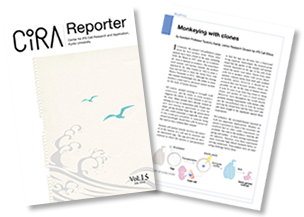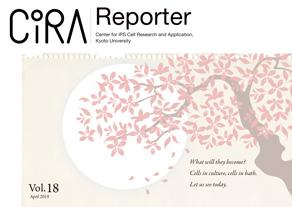CiRA Reporter

The Center for iPS Cell Research and Application (CiRA) publishes irregularly newsletter in which our members contribute an essay on current bioethical issues for readers unfamiliar with the field.
Click here for the CiRA Reporter page

Sharing thoughts to a scientist you have never met
CiRA Reporter Vol.18
April 26, 2019
Mika Suzuki
In Japan, there is very strong support of iPS cell research and clinical application from the general public. Much of this support is attributed to a favourable approval rating CiRA Director Shinya Yamanaka.

Monkeying with clones
CiRA Reporter Vol.15
July 25, 2018
Tsutomu Sawai
In February, the journal Cell published a paper about the first monkey clone. While other animals have been cloned in the past, including Dolly the Sheep in 1997, none are as evolutionary close to humans as monkeys.

Clinic websites mislead about stem cell therapies
CiRA Reporter Vol.14
April 27, 2018
Taichi Hatta
Continuing advances in stem cell research has added to the expectation of these cells becoming a common form of therapy used in the clinic. However, society demands scientific proof before an experimental therapy is used on humans.

The need for dialogue
CiRA Reporter Vol.13
January 26, 2018
Mika Suzuki
Recently, the word “dialogue” has been on my mind. For example, the other morning I was watching the news and heard that a disagreement between two parties would be resolved by dialogue. But the news never explained what type of dialogue. Is it chatting while enjoying tea together?

The symbiosis of the artificial and the natural
CiRA Reporter Vol.12
October 26, 2017
Jusaku Minari
The news has been giving lots of attention to artificial intelligence recently. AI has spread to all sorts of industries, from entertainment to business, law and order, national defense, and of course medicine.

Who decides what is permissible? Genome editing of human embryos
CiRA Reporter Vol.11
July 12, 2017
Yoshimi Yashiro
In my previous essay, I discussed issues surrounding genome editing. By chance, the topic has since received inordinate media attention, bringing it to the forefront of scientific research to the general public.

The future of infertility medicine
CiRA Reporter Vol.10
April 24, 2017
Tsutomu Sawai
Science is making great strides in creating germ cells, like sperm and eggs, in the lab. This research has been instrumental in under- standing how reproduction works, leading to new discoveries about the causes of infertility and possible treatments.

Communicating science to the public
CiRA Reporter Vol.6
April 25, 2016
Yoshimi Yashiro
At the most recent meeting of the Japan Society for Regenerative Medicine last March, we conducted a discussion about how researchers in the field are communicating their findings to the general public.

Gene editing the human embryo
CiRA Reporter Vol.5
January 21, 2016
Misao Fujita
In the previous newsletter, I described some of the special ethical issues regarding the genome editing of human embryos, namely the use of human embryos for research and the potential of creating living human beings from edited embryos. In this essay, I would like to delve deeper into this second consideration.

Gene editing the human embryo
CiRA Reporter Vol.4
October 9, 2015
Misao Fujita
In April this year, a research team in China reported the first gene editing of the human embryo. This accomplishment was made in a background of discussion by leading academic journals and societies about the ethics of such editing.
